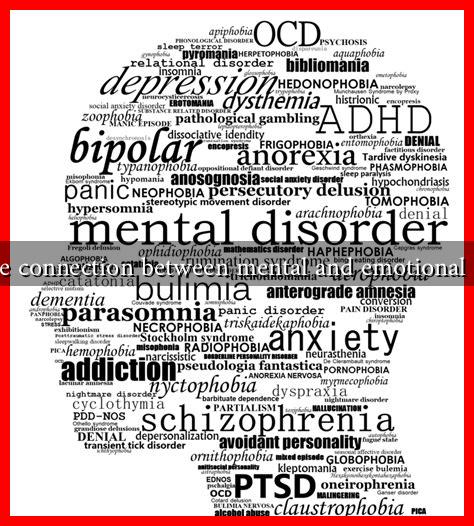-
Table of Contents
- What is the Connection Between Mental and Emotional Well-Being?
- Defining Mental and Emotional Well-Being
- The Interconnection Between Mental and Emotional Well-Being
- Statistics Highlighting the Connection
- Case Studies: Real-World Examples
- Strategies for Enhancing Mental and Emotional Well-Being
- Conclusion
What is the Connection Between Mental and Emotional Well-Being?
The intricate relationship between mental and emotional well-being is a topic of growing interest in psychology and health sciences. Understanding this connection is crucial for fostering a holistic approach to health that encompasses both mind and emotions. This article delves into the definitions, interconnections, and implications of mental and emotional well-being, supported by research and real-world examples.
Defining Mental and Emotional Well-Being
Mental well-being refers to cognitive functions, including how we think, feel, and behave. It encompasses aspects such as stress management, resilience, and the ability to cope with life’s challenges. Emotional well-being, on the other hand, relates to our ability to express feelings, manage emotions, and maintain healthy relationships. While distinct, these two forms of well-being are deeply intertwined.
The Interconnection Between Mental and Emotional Well-Being
Research indicates that mental and emotional well-being are mutually influential. Here are some key points illustrating their connection:
- Emotional Regulation: Effective emotional regulation is a critical component of mental health. Individuals who can manage their emotions tend to experience lower levels of anxiety and depression.
- Cognitive Functioning: Mental health issues can impair emotional responses. For instance, depression can lead to a diminished ability to experience pleasure, affecting emotional well-being.
- Stress and Resilience: High levels of stress can negatively impact both mental and emotional health. Conversely, strong emotional support can enhance resilience, helping individuals cope with stress more effectively.
Statistics Highlighting the Connection
Several studies underscore the link between mental and emotional well-being:
- A study published in the Journal of Affective Disorders found that individuals with high emotional intelligence reported better mental health outcomes.
- According to the World Health Organization (WHO), depression is a leading cause of disability worldwide, affecting emotional well-being and overall quality of life.
- Research from the American Psychological Association indicates that individuals with strong social connections experience lower levels of anxiety and depression, highlighting the importance of emotional support in mental health.
Case Studies: Real-World Examples
Several case studies illustrate the connection between mental and emotional well-being:
- The Impact of Therapy: Cognitive Behavioral Therapy (CBT) has been shown to improve both mental and emotional health by helping individuals reframe negative thought patterns and manage their emotions effectively.
- Workplace Mental Health Programs: Companies that implement mental health initiatives, such as stress management workshops and emotional support resources, report higher employee satisfaction and productivity.
- Community Support Groups: Programs that foster emotional connections, such as support groups for individuals with mental health challenges, have demonstrated significant improvements in both emotional and mental well-being.
Strategies for Enhancing Mental and Emotional Well-Being
To improve both mental and emotional well-being, consider the following strategies:
- Practice Mindfulness: Engaging in mindfulness practices can enhance emotional regulation and reduce stress.
- Seek Professional Help: Therapy or counseling can provide tools for managing emotions and improving mental health.
- Build Strong Relationships: Cultivating supportive relationships can provide emotional support and enhance resilience.
- Engage in Physical Activity: Regular exercise is linked to improved mood and cognitive function.
Conclusion
The connection between mental and emotional well-being is profound and multifaceted. Understanding this relationship is essential for developing effective strategies to enhance overall health. By recognizing the interplay between our thoughts and feelings, we can take proactive steps to improve our mental and emotional states. Whether through therapy, community support, or personal practices, fostering both mental and emotional well-being is vital for leading a fulfilling life. As we continue to explore this connection, it becomes increasingly clear that nurturing our minds and emotions is not just beneficial but essential for holistic health.


